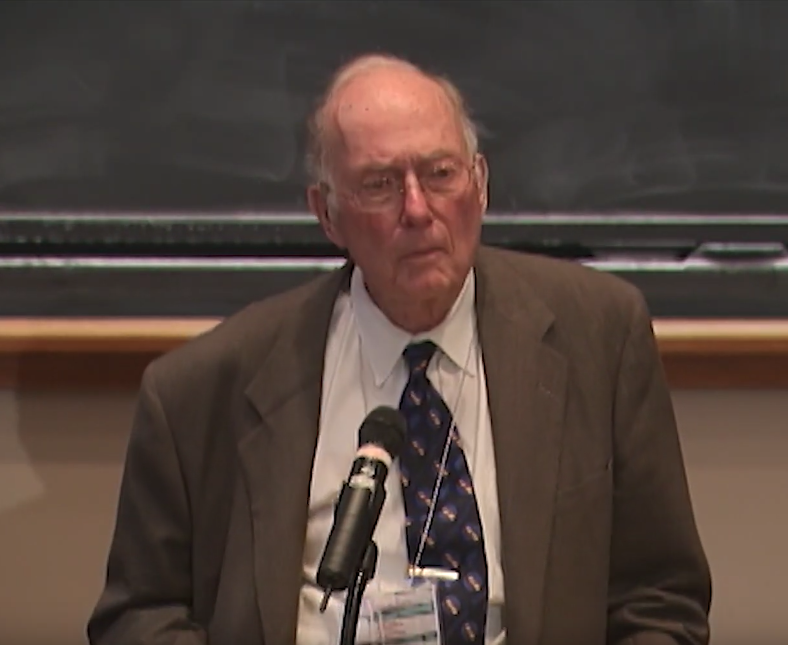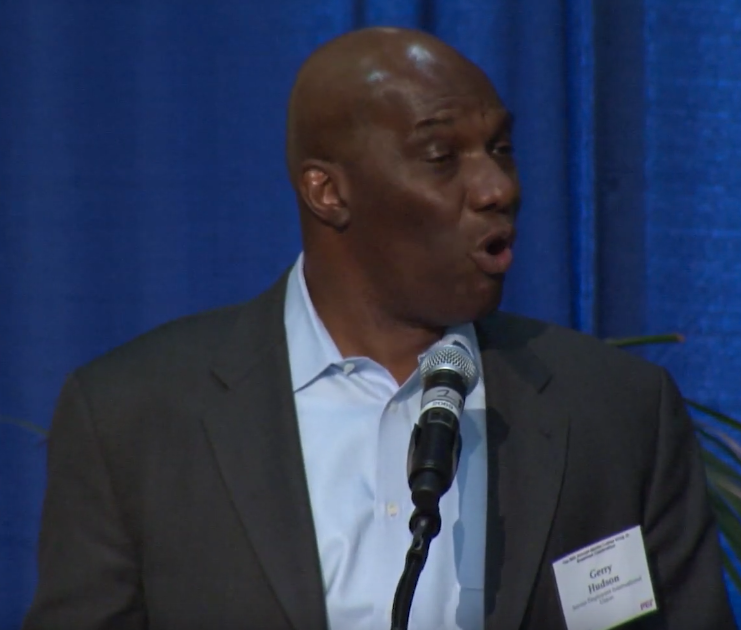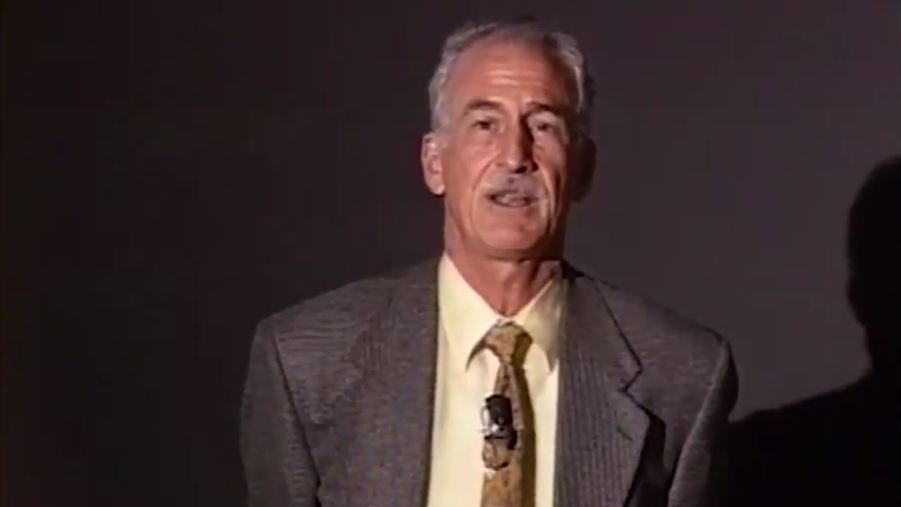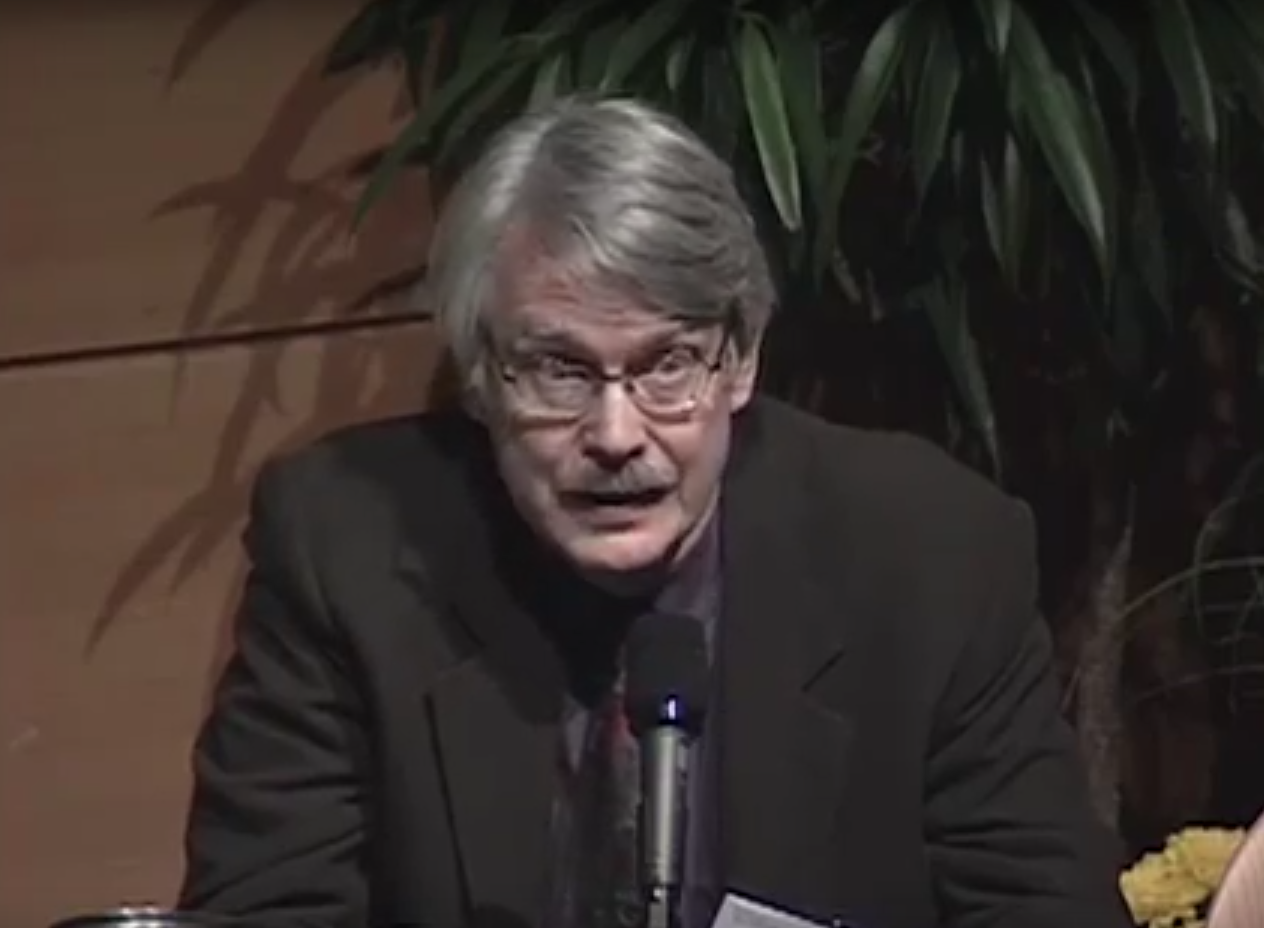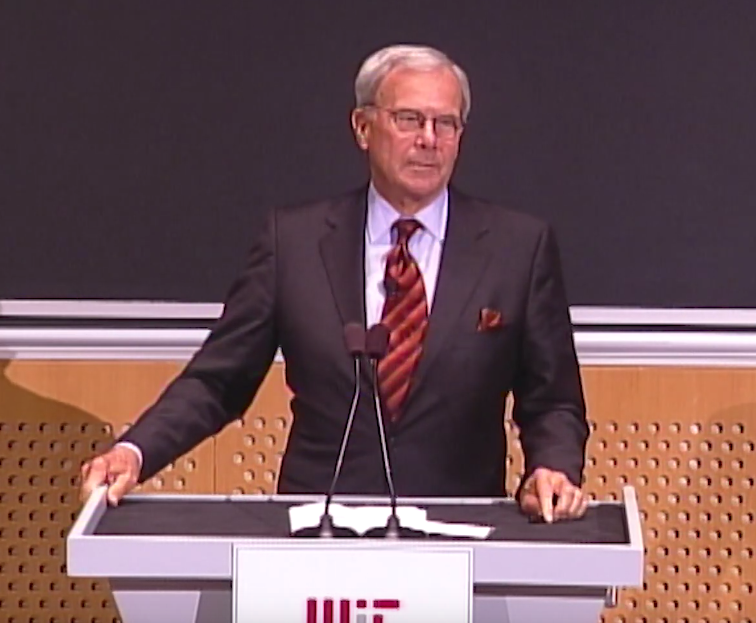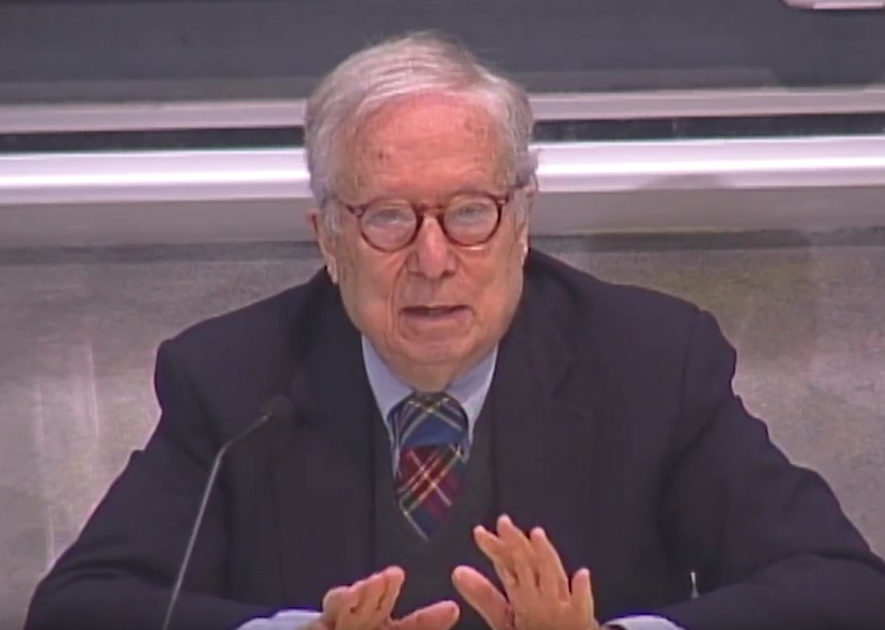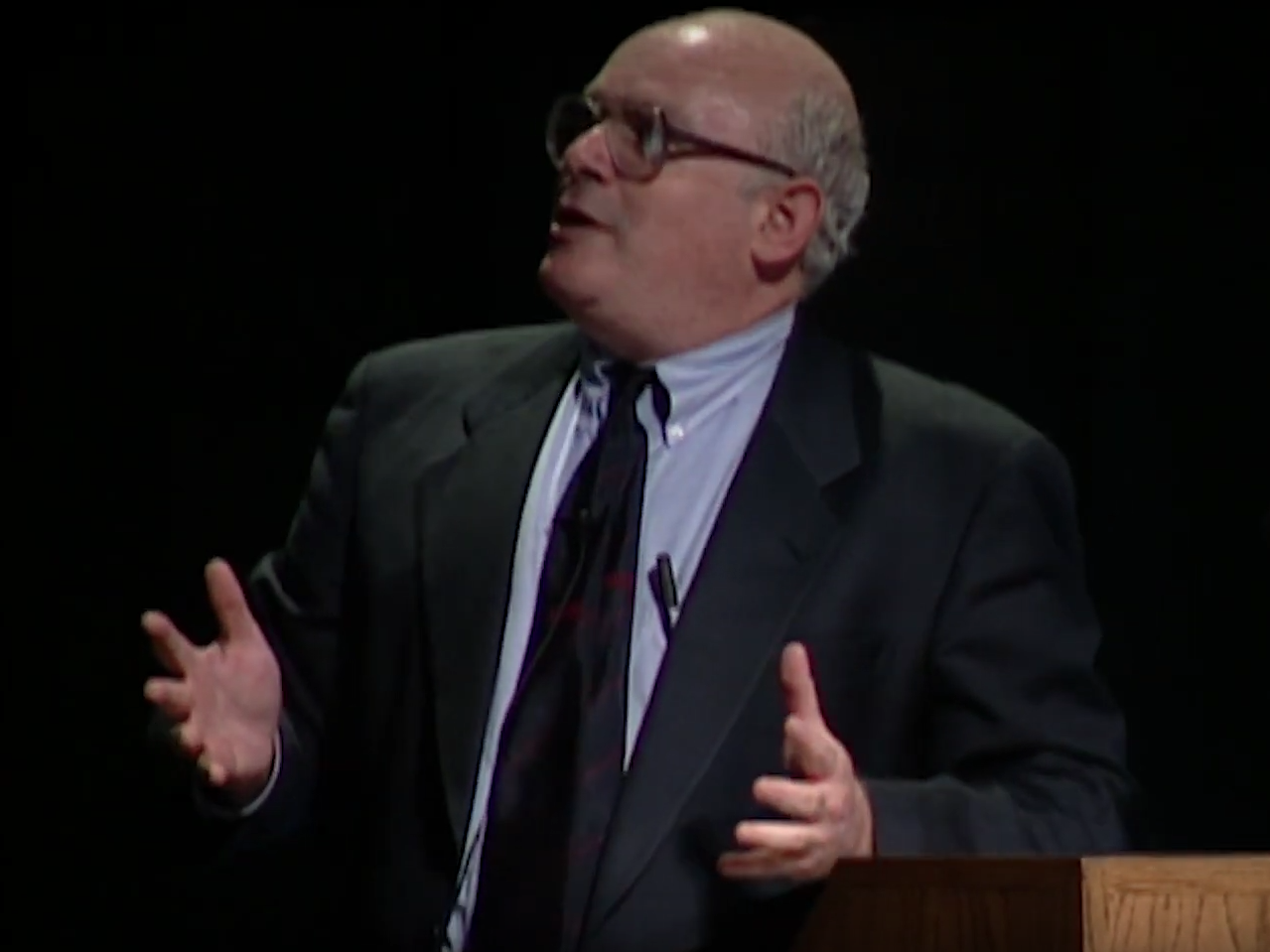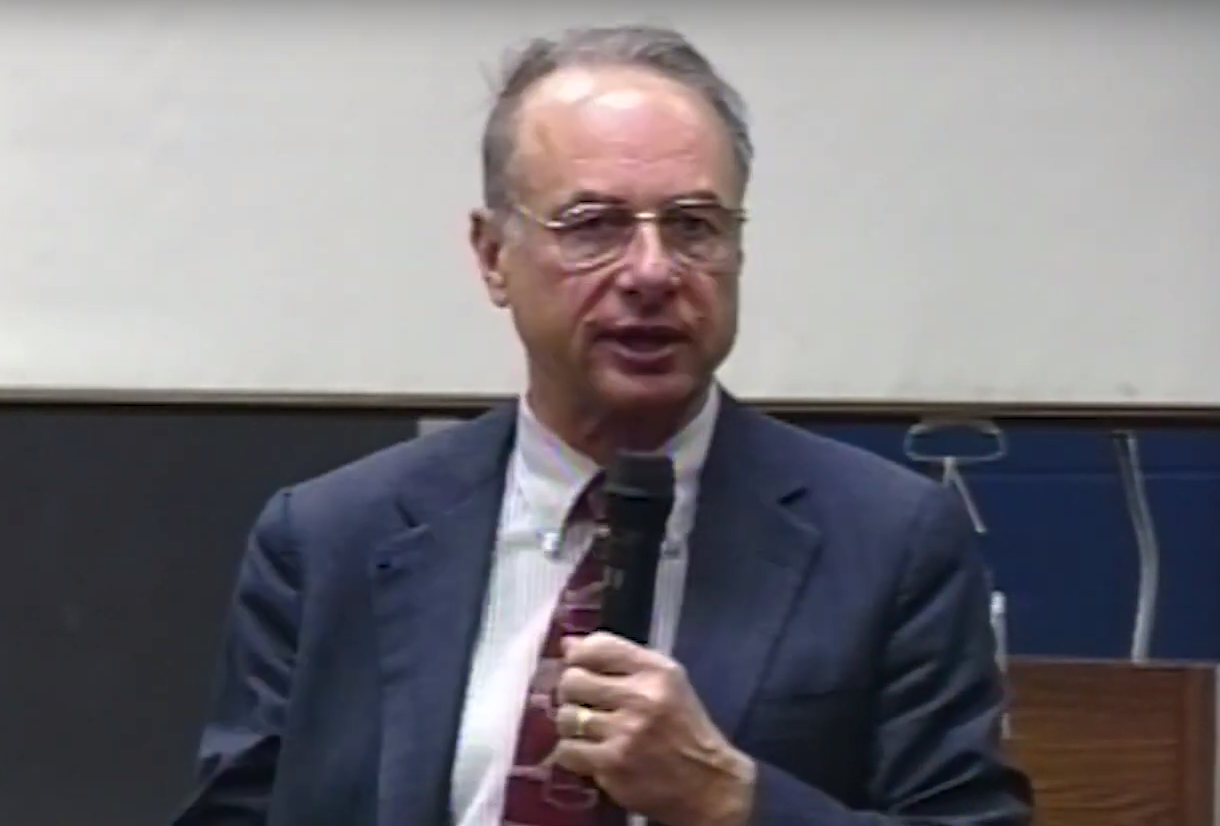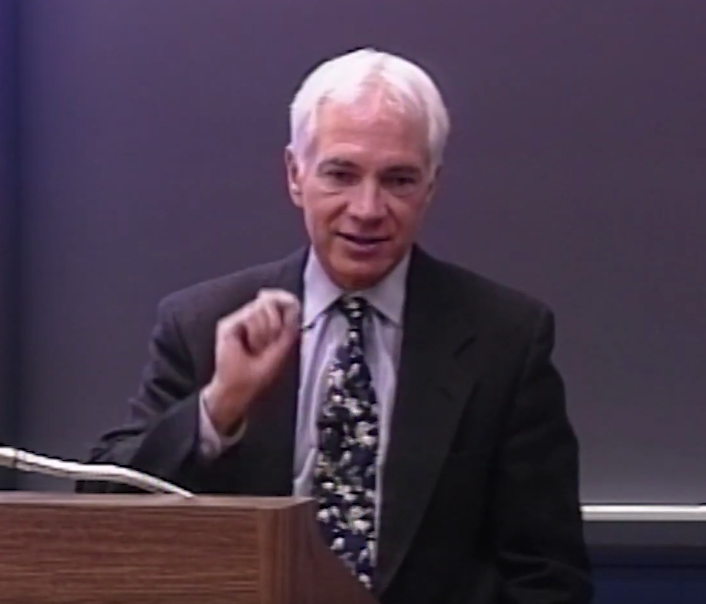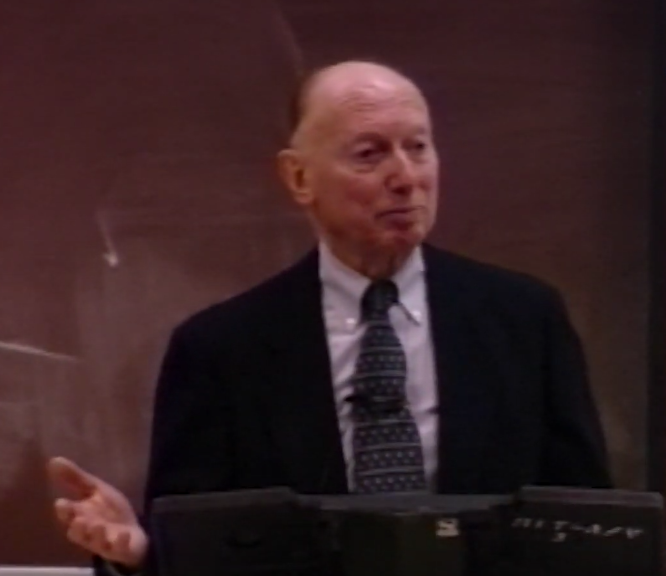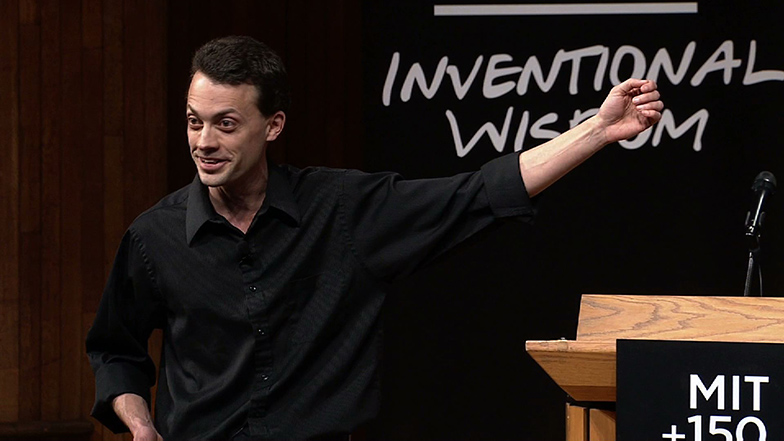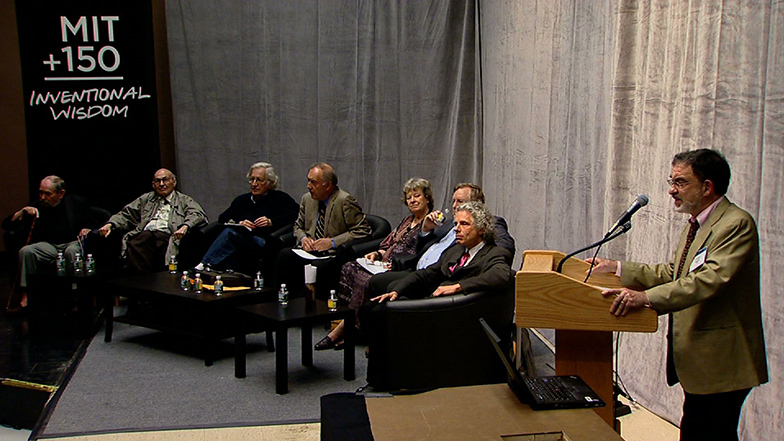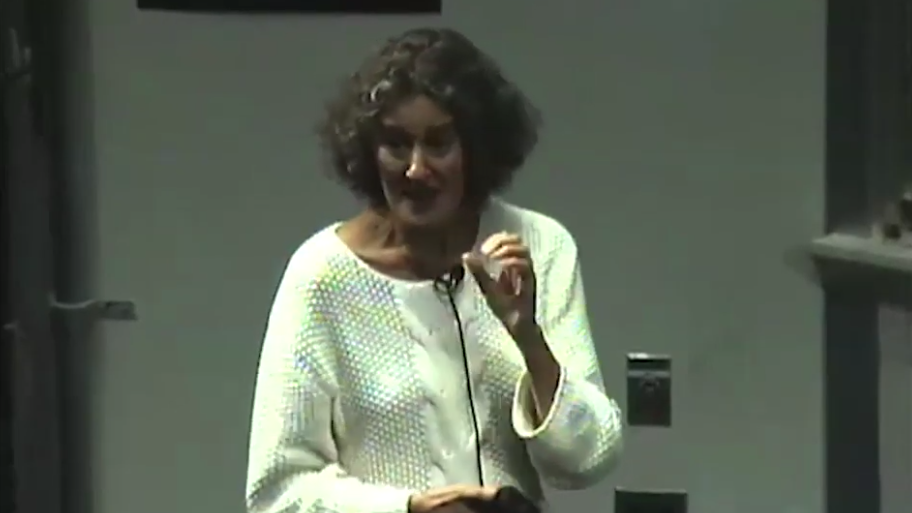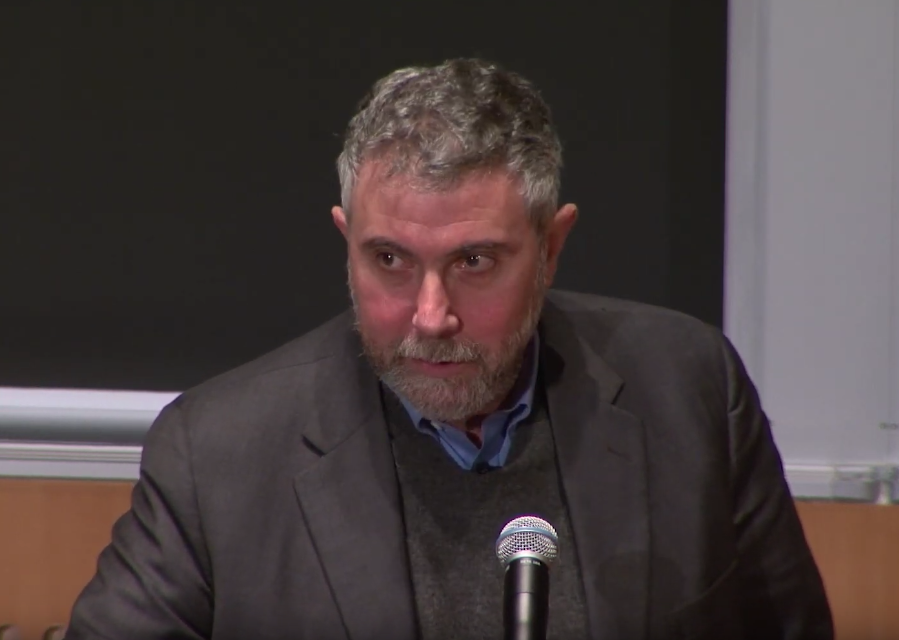Franco Modigliani, "Italy and 20th Century Economics" (Lect. 1) - Nobel Laureates Lecture
MODIGLIANI: Welcome to this show. This is a real chart show, as you will see. [INAUDIBLE] women, but [INAUDIBLE] Italy.
AUDIENCE: [INAUDIBLE]
MODIGLIANI: As you know, some of them from-- you are from Italy, and some are not. But Italy is a truly fascinating country in terms of what's happened to it in the last, let's say, since the 20s, OK? Because you have to really go back to the Fascist period to understand what's happened more recently. And as you perhaps know, the Fascist took Italy over in 1922. And the regime lasted roughly until 1944, when the-- well, in parts of Italy, it continued, with the so-called Repulicino government. In other parts, it ended earlier. And the-- during this period, Italy was ruined first slowly and then quickly. Between '22 and 1938, in the period in which the world developed, Italy was essentially static. Nothing happened.
There were short periods of [INAUDIBLE] growth followed by periods of stasis, followed period of contraction. Why? Well essentially, because the economic policy was mistaken from the very beginning. Mussolini made a decision in the early '20s to maintain a high parity. That is, he fixed the exchange rate at a level so-called [INAUDIBLE], level 90. It was 90 liras to the British pound, which was totally inconsistent with the price level that Italy had at that time as a result of the war. Now, I didn't mention that because, you know, Italy in the war on the side of the allies. Italy won the war with the allies. It was very, very hard. It was a great sacrifices, out of which they got very little, except essentially freeing a couple of provinces in the north, which were under Austria.
So it was already in a weak state, and this decision was disastrous. It cost Italy even more than it cost Britain to stay on the gold standard until the 1932. Essentially, a mistake that has been done by others. But when you try to maintain a currency overvalued, what happens is that you lose in terms of foreign trade, and the only way you could try to keep it is by deflation. It is by actually getting prices down. In other words, you fix the exchange rate. Instead of letting the exchange rate at a level which is consistent with your price level and the other people's price level, you first fix the exchange rate, and then you go to fix the-- force the price level to be consistent with it. So there was an extended period of deflation and unemployment. And I think it was all summed up very well in the famous song, radical revolutionary song, or certain prohibited song, that used to be sung by many people went against the regime, which essentially went like this. [SPEAKING ITALIAN] When we used to sing the red flag, [SPEAKING ITALIAN] you know, [SPEAKING ITALIAN] was the flags of the socialists. When we used to have the socialist flag, at least we would eat something. [SPEAKING ITALIAN] And now that we have to sing [INAUDIBLE], which is the song of the regime, we die old of constipation. Essentially we have nothing to eat.
So then, came the [INAUDIBLE] war. See this was in '28 and lasted through the worst of the Depression in the other countries. Then came the [INAUDIBLE] war, which was again, costly, very costly, for the Italian people, both in terms of actual use of resources and because of the fact that the other countries had a boycott because of Italy's vision of Utopia, the so-called [ITALIAN], which we are not very serious, but enough to produce some problem. And then lead to the strengthening of a policy which had already begun earlier, which was the policy of self-sufficiency. Since we could not import, they would produce themselves. And so they started to do crazy things, which the most famous was the production of wool [INAUDIBLE]. It was fantastic wool. It costed three times as much as the wool made by the sheep. And it's probably not as good I don't think that I've ever used it. But it was typical of the [INAUDIBLE]. And the essentially was highly protected, all right? And they were almost closed international trade.
Now, then, finally, they joined the war with the Nazis. And after the very brief, very token victory against France, when they occupied a certain portion of the Riviera, which has always been in dispute but not seriously [INAUDIBLE] for a long time. But the Italians claimed-- had some claim to it. Then, of course, they were invaded by the allies and by the Germans. And the country was essentially destroyed. So that came out in 19-- at the end of the war, in 1942 or '43, with the country which was totally down. And there was a period of very wild inflation which was quickly straightened out by one of Italy's notable economists, who was then Mr. [INAUDIBLE], who was then governor of the Bank of Italy. And he was able to bring the inflation on the end, with a combination of the proper policy and the beginning of the Marshall Plan. The Marshall Plan brought in goods. And that helped to deflate the speculation-- people were sort of speculating and withholding goods, hoarding goods, in the expectation of higher prices that was truncated by the Marshall Plan. And so they were able to end the inflation.
And there began the Italian Miracle. Roughly around 1950, '52, there was a very rapid reconstruction. And in a relatively short period of time, they went above previous peaks. And began to grow at a level, which had no comparison in the world, except in Japan. And here, I'll give you just one chart. Now, let's see if I can get this right. It's not right.
AUDIENCE: [INAUDIBLE]
MODIGLIANI: Oh, I see. I had it right before. No, I see. Like this?
AUDIENCE: [INAUDIBLE]
MODIGLIANI: I'm going to have to remember how to do it. Anyway, this is the rate of growth. The rate of growth. You can see that in the beginning, only in 1960, essentially. I don't have the period before that. By 1960 was the beginning of the real development. And you can see that there were exceedingly high rates of growth reaching 6%-- 8% and 6% in the early '60s. And then, down to essentially '63. And then by '64, you had the first episode of inflation and contraction produced by monetary policy. Essentially, in '64, they reached full employment. And there was a modest explosion of wages. Wages went up because they really had reached the bottom of the barrel of manpower. They'd reached full employment and gone beyond.
And there was a burst of inflation. And the Bank of Italy had a very tight policy, which produced a contraction, which you see there in 1964, '65. And then they picked up again. And then, you have other sharp oscillations, as you can see. And you will see them in other forms, which essentially correspond to the valuations. See, one of the characteristic things, for instance, of the period, is that you see there is a spike after '72, in '73, '74, there's a spike, very high level, which was, of course, a typical error of policy. Because this was the time of the first oil crisis, where there was wild inflation all over the place. And their proper policy was to try to keep things cool. And so if the Germans were very successful, the Japanese extremely successful, they were able to avoid inflation almost completely. But the Italians were involved in this period in which the unions were pushing very hard to expand. And the central bank actually accommodated that and produced a very high peak.
Two years later, there was a devaluation, because the price level had become totally uncompetitive. They are losing reserves, and they had no choice but to float the lira. There was a sharp devaluation and a contraction.
Now, the important thing-- of course, you can see here that the growth was positive with very few exceptions. In fact, the only real exception is 1993, which is the year after the sharp devaluation of 1992, which I will speak separately. So essentially, I'm concentrating now on the period till 1992, which is the period of the miracle. In the following sense, that if you look on the whole, the growth rate was in the order of 4% or higher. During the period from '92-- from 1960 to 1992, which is the crucial year where things happen, as you will hear in the moment, which is the second miracle occurred in that year. But after that point, GNP rose 3 and 1/2 times. OK. And, at the same time, population was fairly stationary. Italy has ever since, in Mussolini's time, the population growth was slowing down. And Mussolini made a great effort to push for a larger population. The way our premier paid for people who had many children, and there were regularly shown in the press. The great Italian families. The [SPEAKING ITALIAN]. And or achieved by Mussolini. And so if I had seven children or more, they were elected to meet with Mussolini and be congratulated.
It didn't get very far, as far as one knows. It didn't produce any effect. Or perhaps it did. Because after the war, the slowdown has been more and more conspicuous. So that in a Catholic country, which is supposed to be very [INAUDIBLE] very-- paying a lot of attention to what the Vatican said, essentially population has become stationary and now is declining. It's actually one of the very few countries in the world where population is actually declining and you can see houses that are empty because there aren't enough people to inhabit them, essentially, including the centers of towns.
So, the population grew only by 25% during this 40 years. So that if you go and examine what it means on the per capita output, 3 and 1/2 times growth of output. One and a 1/4 growth of population. You'll find that the per capita growth of income was 2.8. In other words, the income increased by almost triple. Per capita income almost tripled in this period. And the country grew from a really poor country. By the time Mussolini had finished, people really had little to eat and little to wear. Literally, people would have no shoes. If you went into the south and the little villages, people literally had no shoes, were very poorly fed and so on. Gradually with a country which was almost normal into a prosperous country.
By 1992, or even now, you can not fail to be impressed when you visit Italy by the fact that people are well-dressed. In fact, better than I can afford. Their shoes cost hundreds of dollars. They are well-fed. They eat well in expensive restaurants. They spend in all directions. And on top of that, they save a very large amount. Now, in the initial period, when they were growing so fast, what would you expect? Well, people who have taken this course know that when the economy-- when the income grows fast, that's when people save. The saving depends on growth.
In those early years, where Italy looked very much like Japan-- and that essentially is through the '60s until 1969, a crucial year-- through that period, Italy grew about as much as Japan-- not quite, but nearly. And saving was as high or even higher than in Japan. The saving rates reached 24%, OK? Which was higher than just about the same as the high point in Japanese history.
Then, of course, left everybody amazed because the indications were that there was no reason to expect them to save a lot after all. Who saves while people that come from the Anglo-Saxon-- how you call it? The religious Calvin-- Calvinistic ethics. That's where people save, right? Like, in this country, 3%. But in Italy, it's a Catholic country, now why should they ever save? Well, the fact is that when you grow, you save. They grew very quickly. And they saved a lot.
And there is, of course, even more than that. Even for give and growth, they saved somewhat more than other countries for give and growth. However, the situation has changed enormously with time, as you can see. Growth has declined. And essentially, the [INAUDIBLE] Well why has it declined? All right. Perhaps I'll go to that, come back to the saving rate.
Well essentially, in the midst of this miracle in terms of productivity, OK? There was, with the life of the Italians, was made miserable by the six plagues, OK? What are the six plagues? Inflation, and I'll show you in a moment. During these 40 years, prices went up 20 times. Wages went up 50 times. Prices went up 20 times. The rest is productivity, the per capita growth.
And unemployment grew from about 3 1/2% in 19-- before the-- at the time, before the first tighten of the central bank, which occurred in '64. In that period, unemployment was down to about 3 and 1/2%, the lowest it had ever seen. From that point on, unemployment has kept rising. And let me show you that. I may or may not have the unemployment figure. Unemployment essentially has grown from 3 and 1/2% to about 12%. There's been somewhat higher, and the figures keep changing because of divisions and because of the fact that they now have adopted the standard European concept, which is different. To me, the crucial question is, how do you define unemployment? And the Italians define unemployment as anybody who would have accepted a job.
OK, so they would ask a person, if you were offered a job, would you take it? And many people say yes. Because they didn't ask them at what conditions. You know, at some wage, everybody would accept a job, I suppose. So people said yes. And then they would treat it as unemployment. Later on, the method of measurement has become standard for the world, including this country. And it consists in asking whether you have actively looked for work in the last two weeks. OK? If you have actively looked for work, then you're treated as unemployed. If you are not, you're treated as not. As not in the labor force. And that has made a fair amount of change. I mean, at some point, the statistics, the Italian statistics gave about 14% unemployment in their definition, which came down to a little over 12% in the new definition.
Now, so you've had gigantic inflation and gigantic rising unemployment. And the-- this, by the way, is the rise in real wages of which we spoke before. You can see how-- is it right? Oh go d. I convinced myself that that is the right way.
AUDIENCE: [INAUDIBLE]
MODIGLIANI: No no no. You can see that real wages have risen consistently and continuously. That's how they managed to rise about three times in this period, OK? Per capita income, a little less than 3%. Real wages are lowered just about 3%. Consistently, of course, mostly between '70 and '80. But they are rising. That's a [INAUDIBLE] scale. So, but mostly-- I'm sorry. This is-- yes. I think this is looking at-- yea, it is looking at it [INAUDIBLE] scale. Yes?
AUDIENCE: [INAUDIBLE]
MODIGLIANI: Sorry, say again.
AUDIENCE: [INAUDIBLE] The costs for increased productivity.
MODIGLIANI: The costs for increased productivity. Well, good question. Very good question. First of all, in general, this is a very hard question to answer. However, we do know this. That the miracles, which you have now have seen, of country growing. First miracle were Italy and Japan, growing for a while above 6%. 6,%, 7%, 8%. But as the United States never grew more than 3 and 1/2% or 4% at the very highest point, now it's below 2%.
It's always been known that this phenomenon is the result of two fundamental features. The existence of an intelligent, well-trained labor force. You have essentially people that could do fairly complex task, OK? With technology, which has been developed elsewhere, OK? In the beginning, this country do not develop a new technology. They just imitate and they import the technology. And they can then grow very fast. They also need capital. But of course, in the post-war period, capital has been mobile. And then, once you begin the rapid growth, you begin this huge amount of saving which helps you to bring in the necessary [INAUDIBLE] the necessary capital. So it's this combination which you have observed.
Japan, Italy, and then Korea, Taiwan, et cetera, et cetera. All these countries have a very similar path where they begin by with very low wages, they begin to essentially use the low wage with imported technology and capital for very fast growth, high saving, to enable them to enhance their capital endowment. And then, at some point, they begin to be net exporters of capital. So in the case of Italy, even in the case of Italy, it happened, but not very much. Because by that time, the growth had slowed down. And so there wasn't really as much of an opportunity. In Japan, it continued.
So essentially, those are the essential ingredients, OK? And Italy certainly has this endowment of a well-trained, hard working population, that certainly is-- on top of which, Italy sort of developed another unexpected feature. A tremendous entrepreneurial capacity. That was completely unknown to Italy. And when the resurgence began, it was driven by the large firms, by the Fiats, but the Pinelli, the big firms in Italy. They were-- and the textiles and so on. But gradually, it was the small firms that began to grow. And of course, by now, all the dynamics comes from small firms, 100 people or less. And this is an incredible-- an incredible component of the economy. Because you have these medium and small firms highly specialized, OK? And they produce some small gadget for the whole world. OK? Now, more or less, small gadget. Yes?
AUDIENCE: I have a question. Do you consider that a strength or a weakness, in the industrial economy in Italy? Like, in other words, these small firms have very high profitability ratios. But when you look at the absolute level of profit, they're small. And the absolute level of profit is what you actually need to finance R&D projects. Or, you know, any-- especially on a large scale. So, do you think-- does the small size of the Italian average company is a good thing or a bad thing for [INAUDIBLE]?
MODIGLIANI: No. I think the economy of the small firms is in very good shape. They make plenty of money. I don't know exactly where the profits go or how did you meant-- when you say they are not high, I'm not sure how--
AUDIENCE: No, I'm saying the absolute level of the profit. Because they are profitable on a percentage basis. But they're very small. And so when they have to compete with large firms--
MODIGLIANI: No, but I mean, look, percent basis is dependent on size. If every firm makes 20%, OK, then the whole country makes 20%.
AUDIENCE: Yeah, no. But what I'm saying is--
MODIGLIANI: Cause they are small, but there are many of them.
AUDIENCE: No, but what I'm saying is, if the company's small, than the absolute amount of money that a company has to finance certain investments, especially in R&D--
MODIGLIANI: Yes.
AUDIENCE: It's going to be small.
MODIGLIANI: Yes.
AUDIENCE: So when a small economy--
MODIGLIANI: Relative to what they need. You know, I mean, small. I mean, let's put it this way. There is no question that one of the problems of Italy is the difficulty of financing. And that is because of the fact that these firms have either to finance themselves, either self-financed, or get credit. And there is really no market except banks. And the banks are inefficient and monopolistic and very exploiting-- very much exploiting. So it makes it hard to obtain the necessary capital. Now, there have been some ingenious attempts at developing things and improving things. One of the notable Italian inventions are the credit cooperatives. That is what they do, because essentially, the banks say, you are small. I don't trust you. You are small. I don't trust you. And so on and so on. They band together, and they guarantee each other, and they present themselves to the bank as one unit which demands large amounts, OK? Or can handle larger amounts. And then they get a much better treat. Much better treatment.
For the rest other institutional improvements, which should have come have not. Because one of the things that you would like to encourage is the use of equity capital, including the issue of shares. OK? Now, firms are very reluctant to issue shares, because they don't want to share the profits with anybody else. But they are quite willing to borrow, but not willing to share into the profit. So it's hard to get them. But on top of that, there is no market, OK? Because the Italian market is underdeveloped anyway. And these are small firms. So you have to really create a market from [INAUDIBLE]. And there are possibilities.
In particular, it would be very possible to have funds, OK, which divide their investment over many small firms. OK? And thereby-- but that has never developed. In part, because the Italians-- it's incredible how capable they are when it comes to production. How incapable they are in terms of government and the financial system. What have they done? They said, we'll create these funds. But you know what? We don't trust funds. They may misallocated source. Therefore, they must liquidate every 10 years. Now, can you imagine that? It's just ridiculous. Because you invest in something, because it's a long outlook. And now you have to sell it, OK? I mean, that just discourages it. And furthermore, when you do sell it, you could create a real problem if many of these funds have to unload at the same time. It can create a real nightmare. So it's the most stupid thing to do. Why don't they let the funds decide how long they want to live? I mean, that's the way it is. I am the director of a fund that the fund establishes that it will live until the stockholders decide, or the management, ask the stockholders to close it. Then it will end. But there is no natural death, OK? It's just a stupid idea, the idea of having a time in which you must liquidate everything.
AUDIENCE: Would you actually be in favor of consolidation, like, putting things together with mergers, acquisitions? Like, instead of having a lot of small firms--
MODIGLIANI: Merger of firms. Well, I don't know about that. Because these firms, I have seen quite a number of these firms, I've visited quite a few. And they are very much family managed. The father and children and sometimes the grandchildren are those that do everything, do all the decisions. And they have a remarkable ability, both from a point of view of commercial, from the point of view of technology, and from a commercial point of view. And you know, what's remarkable is that-- for instance, I have spent some time on the Lake Orta, which is in northern Italy. Around the lake, there is a large number of small firms which specialize in [ITALIAN], which means faucets, literally speaking. Faucets for both industrial and for households. And they are very specialized. They make faucets for a very particular kind of thing. And they're all very prosperous. All quite small. And they sell all over the world. OK?
I don't know how they handle the correspondence in all kinds of languages. But they somehow manage to do that. And one thing that I wan to note is this, that the ability to deal with foreign markets used to be very much hampered by one of the characteristics of the Italians. I don't have time to speak about everything. But I have been recently asked to give a TV interview on the following subject. They interview, those interviewed were outstanding Italians living abroad. And the question was, what are the defects? What are the shortcomings of the Italian?
[SPEAKING ITALIAN] OK? What are the vices of the Italians? And my reply, my first reply was, that the main vice of the Italians is [ITALIAN]. OK? Now the Italians know what that means. It essentially means cunning, OK? Or low cunning, actually. The worst kind of cunning. They used to take great pleasure in taking advantage of each other, OK? I can't use the proper word. But in Italian, it's [ITALIAN]. OK? And that means, essentially, that they were very anxious to cheat everybody except the family. There's the insiders and the outsiders. All the outsiders were candidates for cheating. And they applied that to their export. So they took great delight in cheating to stupid foreigners who bought from them. They would give them old merchandise or not deliver at all or not pay or whatever it is.
Now since the war, they have learned to be scrupulous. And they've become excellent [INAUDIBLE] excellent name in terms of promptness, of exactness, of-- total reliable. Now they still are [ITALIAN]. They still are cunning in with respect to the government, OK? They no longer try to cheat each other. All the cheating has now gone with the government, which is not their family, is not the foreigners. And therefore, they don't pay taxes, OK? And they are deeply into the habit of corruption. That is, they try to get all kinds of favors by bribing officials, who, again, are very glad to cheat the government.
That still is a great problem Italians face, and which I think gradually, will mature. But it's going to take some time.
AUDIENCE: Why do you think that this entrepreneurial spirit [INAUDIBLE]
MODIGLIANI: Why do you think that it has occurred in Italy? Well--
AUDIENCE: No, no. It's more that it's-- well, in the last 10, 15 years, the world [INAUDIBLE] have declined. Why do you think that this entrepreneurial spirit had not been reflected in the growth rate in Italy?
MODIGLIANI: In the growth rate? No, no. It is-- well. You have to see in a moment. We'll see why-- where the problem lies. What caused the slow growth. It's not [INAUDIBLE]. As you will see. The cause is entirely different. And in a word, until 1992, OK? There were these six plagues. And let me go over them again. Inflation. I already told you what happened to inflation. Unemployment. I told you what happened there. Deficit of the balance of payment. Deficit of the treasury of the fiscal deficit. OK? Corruption. OK? And, let me think of the last one. And bad government. Bad government, OK? Incompetent, dishonest government. The citizen was dishonest with the government, and the government was dishonest with respect to the citizens, with respect to its duty.
Now, I will cover each of these, OK? Let me first look at the first four. OK? The first four, at least the first three-- unemployment, inflation, and deficits in the account with foreigners-- are all due to one single cause. And that cause is the unions. OK? Italy has-- I've had very powerful unions. They got together for the first time in 1969. And they made a tremendous push for wage increases, which gave rise to a period that has been called the hot autumn. The hot autumn began in the fall, late fall '69, and ended in '70. And let me show you here something about the--
First, on the positive side, let me show you something else on the positive side. Namely, that what contributed enormously to the productivity growth and to the actual growth to some extent, is this [INAUDIBLE]. Degree of openness. OK? That is defined as the sum of export plus imports, divided by GDP. OK? And you can see that in the beginning, that was very small. That was inheritance of the fascist self-sufficiency, OK? Under Fascists, it was even lower. It was down to 15%, probably. And it grew. Italy got essentially into the world economy. And it had tremendous advantages. It was able to export and import, OK? Getting things cheaper, selling things that it could produce well and so on. So you have here a fantastic example of the advantages of international trade. And that's one of the really important motives for the growth and productivity growth.
Now, OK here, you have the essence of the problem. That the unions were able to secure-- this should really be, I guess, like this? I think the rate of-- yes, it's written properly. Yes, it's proper, yes. That is your rate of growth of nominal wages, OK? You can see that it never was below 4%. Now there is a fundamental principle to understand. That our economies-- our market economies-- use a fundamental method of pricing. I mean, fundamentally, prices are a markup. Fairly stable markup over union-- over unit labor cost. Unit labor cost is the cost per hour divided by the productivity per hour, OK? That is what gives you unit labor cost. In other words, it's the cost of labor, but adjusted for how much it does, OK? So if it is paid twice as much, it produces twice as much, than the cost of labor per unit is unchanged.
Now, so whenever the wages rise modern productivity, what happens? That unit labor cost rises and prices tend to rise, to the extent that they can. And that, we'll have to see in a moment how that goes. So fundamentally, the inflation [INAUDIBLE] effect that the unions kept pushing-- you see the first great push is it 1964. That's when there was the first running out of labor, OK? There was a sharp rise in wages because it was competing for the little labor available. But the next big, big, sharp peak is 1970, OK? The labor peaks are higher. But that's during the oil crisis. Because by that time, inflation was very high. And therefore-- OK.
So it's 1970. That is the crucial point where, for the first time, you can see that wages rose about 22% in one year, OK? That was way above the productivity, of course, which was then rising maybe 5% or so. And began producing inflation. Now, when you have this huge push of wages-- of nominal wages-- and the unions were strong enough to be able to impose this higher wages on business, on firms, that what happens? Well, the firms try to push the higher labor cost into higher prices, OK? To maintain the same markup, to maintain the same margin spread, margin of profits.
Now, and here are two possibilities. Either the central bank accommodates or it doesn't. If the central bank accommodates, it means what? It means provides enough money to accommodate the higher prices, and it means having a floating exchange rate, which adjusts so that when the prices rise, the firms do not lose any business. Neither externally, because the external prices have moved without they're costing any competitive advantage, right? Because of the devaluation. And the internal prices, the internal purchasing power, is maintained through the high [INAUDIBLE] supply.
So this combination means that, in principle, they could pass on the entire wage push, OK? But what happens then? And after the central bank is accommodated, and the firms have responded with some lag, prices have risen as much as wages, minus productivity. And therefore, the workers have not obtained the 20% that they wanted. So what's the reaction? And they go back and say, then we want higher nominal wages. OK? And if the central banks accommodates, well they'll get the higher nominal wages. If the central bank accommodates, the prices will rise also. And they will not have it, and it will continue. And you have essentially a fundamentally wage price spiral that can go on indefinitely or get worse. Why worse? Because in the beginning, there is lags, OK? It takes time between the time the firms respond to the wages and the time the wages respond to [INAUDIBLE]. Then people learn that it's going to come, and so anticipate the time. And so essentially, instead of inflation being 10% per year, it becomes 15% or 20% per year. OK? Because it just-- period of time, you get the higher rate of inflation.
Now, what happened in Italy? Essentially that the central bank kept wavering between the two alternatives. I'm sorry, what is the alternative? The alternative is for the central bank to say no, I will not accommodate. What happens then? There's going to be some rising prices anyway, because the higher cost will lead to pushing up prices. However, now, pushing up prices means losing foreign markets and domestic markets. Because remember that the firm in our open economy, a firm is selling to the world, of which one portion is Italy, OK? So you're now losing market to competing firms that sell more, that you sell less abroad. And you sell less at home because they come and sell at home. So you lose competitors to the whole world. And when you lose competitiveness, of course, output declines, OK? Essentially, you have a trade off between the two. Some of it goes into higher prices. Some of it goes into lower output and employment, OK? And some firms are now pushed out altogether because the profits shrink. Because there is a rise in real wages to some extent. The wages rise, not as much as meant. And of course, that workers also get to a point where, as unemployment grows, they tend to be somewhat cooled off and they demand less.
But in this process, what do you have? You have inflation and growing unemployment. OK? Now, normally, we poor economists thought that when you have rising unemployment, then wages will stop rising, right? It's natural, in fact. But even decline, if there is enough unemployment, why not? Why shouldn't wages decline? Well, the unions didn't see it that way. They didn't give a damn about unemployment. They just kept pushing and pushing and pushing, OK?
So, real wages goes up-- went up pretty fast. But unemployment too. And it is worse than that. Because, during this period of restraint, what happens is that nonetheless, your prices have risen. Your competitiveness has declined. Therefore, net exports have declined, OK? And if they declined enough, you find that you cannot pay for your imports. You have reserves. You start digging down your reserves. You get credit abroad. After a while, you get no more, OK?
So what do you do at that point? You have no reserves. You have no possibly of credit. There's only one thing you can do. Let the exchange rate go, OK? So essentially, while you were trying to hold it, hold money supply and hold the exchange rate, at some point, you have to let the exchange rate go. Then you have a very typical period which the Italians called, [INAUDIBLE], The drug-- [INAUDIBLE] would be--
AUDIENCE: Recovery.
MODIGLIANI: Yes the drug recovery. Because this is a short interval during which, essentially, the great [INAUDIBLE] of exports. Because suddenly the Italian goods become cheap, because the lira has gone to the dogs, is devalued deeply. So the selling, there is more employment. They are able to et cetera. And the inflation hasn't yet begun to be serious. So there is a phase in which everybody's happy. But then, the unions realize that they are those who lost. Because the effect of the inflation is precisely that of reducing their own wages. Prices rise, and they come back and start pushing for an increase in nominal wages.
So, you then get into another period in which the bank tries to hold the line. But can't, after a while. So you've had in Italy several deep contractions. And they're preceded usually by phases in which the growth of output is very low, OK? Before they give up, before they let loose. And they have been devaluation repeatedly. Now, of course, on top of that, the inflation was also felt by the oil crisis, and by the fact that they were very poorly handled in Italy, in the sense that-- well, I don't want to go into it-- like, but the only way you can handle an oil crisis intelligently is by persuading the workers that they must not ask for higher nominal wages because they are poorer. It's a fact. OK, They have to be the Sheikh tax. Nothing they could do about it. But they may as well pay it and not try to recover, because if they try to recover, all they get is a spiral, and they'll never recover. OK? So any attempt. Now, Italy let the union-- and the unions and the government let the unions go wild. And they had enormous increase in wages during this period. And as you can see here, during that period, they had gigantic 25%, 26% increases in wages, most of which showed up in inflation, OK?
Now, this situation, this essentially explains this history of growing inflation and growing unemployment. Now of course, all this doesn't occur with perfect continuity. But there are ups and downs. But on the whole, this is what you see, what you observe. Now essentially, the periods of which price spiral, and floating exchange usually came to an end because people were tired of inflation. OK? And then, essentially, they put pressure on the government to establish a policy of non accommodation, OK? Whatever it might cost. They had forgotten the previous crisis. So let's try it again. Well this was tried a few times. And didn't succeed. And then finally, Italy decided that the way to make this policy stick, this policy of holding the line, the best way was to join the EMS. The European Monetary System. So that in 1980-- '79, '80-- they said, we are now going to hold the line, and to prove you that, we are going to fix out a change within the EMS, OK?
And at that time, I could occasionally write editorials, for the [INAUDIBLE], which is the main, Italy's main paper. And I wrote one which said, if you really mean it, that's the best way to do it. Because then you have credibility. Then you know, the workers will understand that you're committed to defend exchange rate. And they will have to be careful in pushing for higher wages. And there followed a period in which, on the whole, the policy worked. That is what happened.
Inflation very promptly declined. I have the slide? I'm learning, huh? You can see the oil. Italy entered essentially 1980. That spike after entering, is the second oil spike, the second oil crisis. You remember that there was a second oil crisis in '79, was just the time they entered. And it was as severe as the first crisis. Shorter, but it was very severe. And inflation was all over the world, not just in Italy. But then, after that, the presence in the EMS produced a very sharp decline in inflation, which by 1985, was down to almost acceptable levels, certainly much lower than they ever had since the '60s, OK?
Now, however-- and here is the interesting story. Even though inflation came way down, it still was larger than the rest of the world. Still was larger than the Germans and the French and the rest of the EMS. And pretty much the same inflation rate. So that their relative prices kept getting worse. OK? Now that is what the economists call-- let me show you this. I think i have this here. Yes. What the economists call the real exchange rate, OK? The nominal exchange rate is dollars per lira. It's the price of the dollar, OK? 1,500. 1,500 liras per dollar. OK? The real exchange rate is goods for goods. So many Italian goods per foreign good, OK? And you get it if you deflate the exchange rate by the price index, OK? So that what you look at is whether the lira depreciates faster or slower than the prices are rising, OK? Sorry, yes.
Now if you look at the real exchange rate, you find that during this period, on the whole, Italian prices were rising faster than foreign prices, while, by construction, the nominal exchange rate was fairly stable, because they were in the EMS. Now, they had a few devaluation on the way. Not so much. And then by the late '80s, they had no more.
Now, on top, you have the nominal exchange rates, OK? And you have to look at the period '85-'92, all right? Now you see that in that period, the nominal exchange rate was just about stable, OK? Very small changes. That with the EMS, because that's the one that was fixed. The rest, they were-- the whole EMS was floating with respect to rest of the world. And below, you have the real exchange rates, OK? And you can see that the real exchange rates keep getting worse and worse and worst.
Now, we are approaching the end of the first period, which ends with the famous devaluation of 1992. Let me show you that, how that went. So here, you can see the real exchange is getting worst. And what happens when the real exchange gets worse is that the net foreign balance gets worse. OK? Here you have a very nice little picture in which you have the dark line is the current account balance, OK? And the white one is the capital account. And essentially, the capital account needs to compensate the current account, or else you have to lose reserves. But of course, the capital account can also act on its own. Various people may decide to invest capital in Italy. And then, it will either go into an appreciation or into reserves.
Now you can see that negative balance is really accumulating already in the late '80s, with one exception. After 1985, the balances were negative. And there is a little positive one in the next year. And from 1987 on, as the real exchange rate got worse, the net foreign balance grew larger and larger and larger.
Now, if you look at the solid line, that confirms what I said before, that the Italian inflation, while coming down, was coming down-- was still larger than the foreign one. And the heavy line is the differential-- sorry-- the broken line is the differential inflation. It's the Italian inflation minus German inflation. And you can see that the differential keeps getting smaller and smaller, but it's always positive. And as long as it's positive, you're losing competitiveness, OK?
So the balance of payment got worse and worse. Now after 1990, the difficulty was handled by the Bank of Italy to attract resources to make up for the negative balance. They kept raising interest rates. And attracting capital. And they were very successful. And there was a while that people somehow had enough confidence so that they were quite willing to come in and invest in Italy for the interest rate differential. OK? So there was a condition of confidence.
By the time you get to 1992, the balance is getting worse, OK? And what happens here is that at one point, people realized that the Italian situation-- Italian exchange rate-- was unrealistic, could not be maintained. Why? First, because it was generating deficits, OK? Now the government, of course, kept saying, you know, we're going to change that. We are going to get the workers to accept smaller changes and we're going to gradually be able to get out of this. But God knows when, OK? But the worse part was that by that time, [INAUDIBLE] was coming on. And the time at which Italy was to enter was essentially in the late '90s, OK, or middle '90s.
Now Italy could not enter with that kind of interest rate-- that kind of exchange rate, because it was overvalued. It would have to do the same thing as Mussolini. Essentially, go into a period of deflation in order to stay in. Very painful. Very costly in terms of unemployment. Unemployment was already very high. So here is a country with high unemployment, which has a large deficit, which in a short time, has to fix an exchange rate. It cannot fix it at the current level. It was at that time 700 to the mark, OK?
So, having decided that Italy could not possibly avoid devaluation some time, people were smart enough to say, well, if sometimes, why not now? Because now is a good time to get out before it happens. After it happens is too late. So mass movement, and including speculators, decided that this is a good time that the Bank of Italy could not hang on to that penalty. And so, there was a very sudden withdrawal of funds. And the lira [INAUDIBLE] Bank of Italy didn't have enough reserves. They tried to defend the exchange rate. They had to give up. The lira collapsed. And there was at first an attempt by the Bank of Italy to try to save the lira, OK? That is, they tried to avoid too high-- I mean, first of all, they offered a devaluation of 15%. They offered to re-enter the system with a 15% devaluation. It was acceptable to the partners, but not to the speculators, who kept, at that price, rushed in and withdrew foreign exchange, OK? So they had to abandon the 15% and let it go. And it essentially lost over 20% or so.
Then they tried to get back into the EMS by high interest rate policy, tried to attract capital, and thereby, build up the lira, OK? Because when capital comes in, that builds up the lira, right? And they tried that for a while. And then what happens is something of which MIT can be proud. Namely Rudy [INAUDIBLE]. He wrote a very famous and influential article towards the end of '92 saying, don't be fooled. Don't try high interest rates and don't try to get back into the thing. The devaluation is helping you export. For years, you've had an overvalued lira. Now enjoy the appropriate, or perhaps even undervaluation, OK? Don't try to keep up interest rate. That kills investment. Keep lower interest rates. Let that devalue the exchange further. It's all good. And he said, he came out with his famous statement, that the mark, which was then 780, could easily go up to 1,000. OK? I was [INAUDIBLE] shock. Nobody could believe it.
And, I, however, quickly believed it. And what really matters is the Bank of Italy began to understand. And after his article, they let the lira-- they give up the high interest rate, they began cutting interest rates, and let the lira devalue further until it essentially reached 1,000. Then came back a little bit because capital was flowing back and the central bank wanted to-- it though 1,000 might be too much. But it came out to 970 or something like that.
And then, essentially, you had--
AUDIENCE: [INAUDIBLE] Since Italy doesn't have a lot of natural resource, having an undervalued lira would increase the imports--
MODIGLIANI: Would increase imports?
AUDIENCE: Yeah, because [INAUDIBLE] to spend-- it cost more--
MODIGLIANI: It costs more liras?
AUDIENCE: It cost more lira. Right.
MODIGLIANI: But, that doesn't-- we are talking about foreign exchange.
AUDIENCE: No, I mean--
MODIGLIANI: You have a problem because you don't have-- you don't earn enough foreign exchange to pay for the goods. So when you devalue, foreign goods cost more. But that means that-- but that means that you buy less of them. You use less dollars.
AUDIENCE: Yeah. If-- OK. If we be more profitable, more efficient in using less resource, it will be right. But I think in Italy we are so efficient to use less resource.
MODIGLIANI: Oh no? You got a surprise coming. Let me, first of all-- I left out one very important thing. In 1992, see, I've mentioned the six plagues. And now, let me start out by talking about the second Italian miracle, OK? In 1992, there was a series of events which suddenly treated all the ills which had created the plagues, OK? Labor unions. The labor unions, after having spent their life pushing for [INAUDIBLE] clauses, OK?
To the absurd level, there was a point where they pushed this to the absurdity that the escalator was called fixed point escalator. Which meant that whenever the cost of living went up 5%, everybody got the same increase in salary, regardless of his [INAUDIBLE]. The same as was appropriate for essentially, the medium, the middle, the median wage, OK? So if the median wage had to receive 1,000 lire, everybody got 1,000. Whether your wage was very low, or whether you were the governor of the Bank of Italy. Or I guess, they probably gets paid more than the head of the [INAUDIBLE].
Anyway, all had to have the same. Now this was a most destroying and destructive system that you could imagine. And I, you know, it made me absolutely mad, and that also a couple of iron hot articles in the [INAUDIBLE] explaining that this was absurd. That it was creating equality by artificial means, OK? It was using inflation as the way of creating similar wages. OK? That if the inflation kept going on, in a little while, they would all have the same wage, you know? After a little difference.
But about the same wage. And in fact, one of my smart colleagues wrote an article saying that there really was nothing wrong with this idea, because, after all, if you use this, in a while, everybody will have the same real wage. At which point, the same point was right. You know, the fixed point was right. Everybody has the same wage. The fixed point was right, OK? Because by that time, the system is caput. And of course, I explained that in addition to the damage in trying to create that kind of situation, it couldn't. And I expected, as it did happen, that it increased inflation. Why? Because the employers found it necessary to maintain the differentials. So if this gave the same to everybody, then they had to pay extra to the people they trusted, the people who did the unpleasant things. And so on and so forth.
So essentially, you had, in effect, that an additional cost of living produced a higher percentage wage increase, which produced a higher percent exchange, et cetera. So it's an accelerating system.
Well, that system eventually came to an end. And the notion began that even escalator clause had to be cooled off. And they first talked about limiting escalators to people below a certain income. I mean, the regular escalator, not this fixed point. But to maintain the regular escalator, just let's say, for the lower 60% of the wage and the variety of things of this kind. And then there was a student of mine who is now a great man in Italy, [INAUDIBLE], who proposed a method which in effect came to negotiating in nominal terms. But to use a different language, he proposed a system in which-- well first of all, he showed the escalator clauses had a terrible effect. That you could never bring an inflation to an end because of the lags. Because this quarter's increase in wages was last quarter's increase in prices. Which meant that the next quarter, that this quarter's increase in prices was like last quarter, OK? And then, it would go to the next one. So you could never, or, with the greatest difficulty, you could bring inflation down.
And so he proposed the pre [INAUDIBLE] on negotiating of the escalator clauses-- escalator ticks. you see, the escalator ticks, you see, every month, it ticks by the number-- by the extent of the increase in wages. And he said, let's agree from now how much the tick will be at the decreasing rate over the next quarter, the next quarter, the next quarter. But that, if you think about it, meant, since the current wages were known, that meant fixing the level of nominal wages. At the growing level, but fixing the level of nominal wages ahead. That was partly adopted, partly not. But in 1992-- oh, by the way, [INAUDIBLE] was murdered in 1973 I think-- 1983, by the Red Brigades, essentially because he was trying to create peace between labor and employers. And that was the worst thing anybody could do.
And his teaching had an effect. And in 1992, the unions agreed, under a new government-- by the way, in '92, the first thing that happened, perhaps, was a new government. Finally, the terribly be bad government of the Christian Democrats from the '60s through the '90s, who are all more or less corrupt, but all incompetent. And all sort of bent on the same policy, which was that of giving all kinds of things to get votes and paying by deficits.
That was the fundamental-- [INAUDIBLE]. If you would raise taxes, see? So you give large pensions, nobody had to pay taxes for that, because you would just borrow, OK? Of course, the cost of borrowing means that you don't have investment, because you simply sacrifice the use of resources for that purpose. So, essentially, this came to an end. And there was, for the first time, since the '60s, an excellent government by Mr. Amato. He essentially was able to persuade the unions to accept a nominal contract, OK? That is a contract under which there was a path of nominal wages, was fixed in advance. Together with the path of inflation, which was fixed in advance, which would give the workers very little increase in nominal-- in their wages, which they will accept in order to realizing their crimes toward the unemployed, they wanted to make up, and begin to be willing to sacrifice real wages to increasing the capacity to export, reducing, essentially, the cost of labor and increasing the capacity to export.
So, the first miracle, then, was a competent government. The second was that the unions suddenly became wise. And ever since that day, they've been exceedingly wise throughout this period. And they may be even now. And my whole program, which I will discuss next period, relies on their being sensible. And I have indication that they want to be sensible. Now the question, just how much, has to be seen. But the principle is acceptable to them.
See, my new book, which I will discuss next time, is called "The Miracle That's Achievable." And it's based on the notion of bringing inflation down to zero with the worker's help. And the head of one of the large unions has already said that he's in favor of zero inflation. So we are on our way.
Now, the next thing was that the judges began the famous investigation into corruption. And they found this incredible amount of corruption, much deeper than anybody had believed. So that at least, there was a considerable improvement, if not the solution, to the problem of corruption at all levels of government, particularly at the lower level. OK? Yes?
AUDIENCE: I have a question.
MODIGLIANI: That's called [INAUDIBLE], as you all know.
AUDIENCE: I have a question for you. Concerning the [INAUDIBLE] problem, there were some people that were arguing that all these heads that were flying due to the [INAUDIBLE] and company was actually stopping a lot of sectors from growth. For example, construction. [INAUDIBLE] Cause no one wanted to put a signature there cause they were scared. And then [INAUDIBLE] came up with the idea of putting a patch and almost forgetting. What is your opinion about the [INAUDIBLE], that type of--
MODIGLIANI: It would seem to me that any reasonable person must think that if the only way of getting employment is by corruption, then he better have his head visited, because he's just been over influenced by imbeciles like Mr. [INAUDIBLE] and the like. OK? This man tried to fix the whole thing by saying that a whole class of crimes would not be treated as criminal offenses. There would be a civil thing. They would be liable to reimburse the government. But they would not go to jail, OK? That's, of course, incredible, I mean, these people are corrupt. They made fantastic amounts of money. They have to pay the penalty clearly.
Now it is true that when this episode occurred, and everywhere they found that the contracts were loaded with additional things which were then paid back essentially. The officials accepted a ridiculously high bid. And then, in exchange for that, he got money from the bidder. Now that was large scale. Now, clearly, that had the effect for a while of stopping of very much restraining the ongoing contracts. People became very scared, both the people who submitted bids and those that accepted them. And that was a phase of stasis.
Now, that, unfortunately, came to occur at a time when the economy was halting, was grinding that stopped. But that, you know, that happened to be. I mean, you couldn't foresee that. And the answer, of course, is to have good laws, and good systems, to be sure that the contracts are not loaded. I mean, that's the answer. Not saying, well, that's a big [INAUDIBLE]. Because and the government has tried that. OK? Still, there's been some delaying. There's no question about it. Yeah? He's our expert on labor from Italy. And he knows all about the [INAUDIBLE], which is the union with which I work most closely.
AUDIENCE: I have a very simple question. Of course, I am entirely sympathetic with your view that Europe has the pre-conditions for a new economic miracle in Italy. And the unions are perhaps the main actor bringing about these new conditions. But if I look at the macroeconmic indicators, I don't see-- I don't see that the situation has been improving. I mean--
MODIGLIANI: No, no, no .
AUDIENCE: After-- after-- let me summarize [INAUDIBLE]. After 1993, we had a very little growth. We have had a lot of labor productivity increases. But labor productivity increases have been used either to pay for the higher prices of imports, or to increase profits. We have had actually an increase in unemployment from the enormous amount, as far as I'm concerned, of [INAUDIBLE] 12.1 now. So, you know, I don't think that-- I mean, it's not the situation that we had--
MODIGLIANI: Just a moment. Just a moment. Since you bend figures around. The figures I have, which are the official figures, say that in 1992 that the employment rate was 11.3%. And now it is in '95, 11.7%. So there has been an increase that's negligible. Unemployment is now going down. Now mind you, all this increase occurred, most of it occurred under the regime Mr. Berlusconi, the magnate who got elected on the promise that he would create one million jobs. And he lost, as you see, he lost 300,000 in reality. That was his promise.
AUDIENCE: Professor Modigliani, I mean if you could see--
MODIGLIANI: No, I mean, I understand all that. Sure. I mean, there are certain aspects, yes, yes?
AUDIENCE: Was the year of highest growth--
MODIGLIANI: Which one?
AUDIENCE: It's 1995. We had about 3.1% from [INAUDIBLE] GDP. And unemployment actually grew that same year.
MODIGLIANI: Not in '95. Not according to these statistics. Depending from when to where. The average for the year went down.
AUDIENCE: Which doesn't generate unemployment. That's the big problem. You know, I'm not very sympathetic to [INAUDIBLE] who is the leader of the Communist [INAUDIBLE] party. But when he talks about the generalized [? reduction ?] of working time, I think there's some point in that.
MODIGLIANI: Now, I mean-- we have to-- we have to move on. You have a very-- you have a valid point. In other words, what you're saying is that there is no evidence. I mean, two things. One is that the workers have ended up losing from this fixed wage-- sorry, not fixed wage. But fixed program or reducing nominal wages, OK? Which they have more or less followed. In the end, they've lost, OK? And there hasn't been much improvement in employment. Now I'll touch on these and explain why. Yeah?
AUDIENCE: No actually, on that point, it seems to me [INAUDIBLE] has of reducing the working time, first of all, it was like, proposed in France some time ago. And I don't know, it looks to me like creating more room for some new people. But, at the same time, will it be necessary to expand the space, and not create more room for some people that are not employed. And so, the issue is, how--
MODIGLIANI: Sorry, what do you mean? [INAUDIBLE]
AUDIENCE: If we-- if we reduce the working time, like instead of working 40 hours a week, I'm working 20 hours a week.
MODIGLIANI: Right.
AUDIENCE: And someone else can get the other 20 hours.
MODIGLIANI: Right.
AUDIENCE: The problem is how to expand the number of job-- the vacancies. Like, we want to have more jobs than are around.
MODIGLIANI: Well, I mean. All right. You're saying that you don't like this particular way of reducing unemployment.
AUDIENCE: Exactly.
MODIGLIANI: Of course, I couldn't agree with you more. I think it's just stupid, plain stupid. But it's also [INAUDIBLE] that I'll come to that in the moment.
Now first, let's a moment pursue the [INAUDIBLE]. So, you've had-- I've mentioned so far, new government, a new union, the cleaning up of the corruption, OK? And, with a fixed wage, a deep devaluation. OK? Now the balance of payment has made miraculous changes. Imports have declined enormously. Exports have risen enormously. Italy was running a deficit every year. Since then, has been riding a rising surplus. It's paid back its debt. It's now accumulating claims on the rest of the world. Incredible effect. OK? Beyond what anybody would have expected. With the lira pretty high. OK.
Now, so, it was very healthy. And of course, as you will see in a moment, it went too far. Because devaluation went too far. But that is where we come to [INAUDIBLE]. OK. Now, however, despite this, '93 was a very bad year, OK? Why? Well, the devaluation was a tremendous shock. Italians began to doubt about everything around them OK? On top of that, there was essentially a warm crisis all over the place. '93 was a bad year all over the world, OK, and in the market. There was declines in output, so there was also declines in Italy.
And finally, by the middle of-- and finally, Armato imposed some rather rigid new financial laws. Raised taxes quite a bit, and began to fight against the evasion by a famous law that essentially required-- it was a minimum tax, essentially. That no matter what, you had to pay at least a certain amount. Unless you could show that you absolutely had nothing. OK? It was up to you to show, OK? There was a doubtful constitutionality, but it was effective, OK?
Now, then, in the middle of the year, in '93, the [INAUDIBLE] government was replaced by the Ciampi government. Ciampi was the former governor of the Bank of Italy, a man of the highest ability and of the highest morale-- highest moral qualities. One of the few men in Italy that only existed in th e Bank of Italy, I think two or three that pay all the taxes, OK? And I know a couple of other things, I think. The former governor did nothing. But it takes very exceptional people. And [INAUDIBLE] was the Bank of Italy is one of the few people that pay all taxes. Not a very scrupulous man. And he put together a government of very able, very honest people. OK? Absolutely highest quality. And you know, some of that is known even to foreigners. And one of the things that everybody recognizes was the fact that he put in charge of the Minister of Culture Mr. [INAUDIBLE], a former editor of the main people of Italy who was able to get museums and other things to function properly, not closing at the hours when the tourists wanted to come.
I remember reading an article that said, Shut-- shut up quickly! The tourists are coming! [INAUDIBLE] Anyway, but everybody else was the highest quality. And there was a man who finally resisted the very powerful-- how do you call it? The people that try to get people favors from the government? What you call it? I'm trying to think of the American word.
AUDIENCE: Lobbyists.
MODIGLIANI: Uh?
AUDIENCE: Lobbyists.
MODIGLIANI: The lobbyists. That's right. The very powerful lobby of the government employees, which is a tremendous number. And they keep getting higher wage increases than anybody else. And Mr. [INAUDIBLE] was able to impose discipline, and issue decrees saying to the employees of the government, remember that you are working for the public, and not vise versa. Because when you went to the post office, they treated you as though they were doing you a favor when they will sell you stamps. And you sort of explained to them that you are supposed to be the servant of the public.
Well these were tremendous achievements. But he also raised taxes, Mr. Ciampi, because he wanted to put financial-- he wanted to straighten out finances. And some of these taxes were bad and very much resented. The worst of them as the absolutely inexcusable one-- I never understood how he could stand for it-- was a tax on the amount of money in a deposit in banks on a certain particular day, OK?
AUDIENCE: [INAUDIBLE]
MODIGLIANI: That was-- that was [? Amato. ?] I thought it was the guy-- what's his name? The minister. Who was the minister?
AUDIENCE: Now, it was [? Amato. ?]
MODIGLIANI: Well it may be [? Amato. ?] But any one of the two. I mean, I guess Ciampi had the tax on the doctor, [INAUDIBLE]. Anyway. Which made him rather unpopular.
Then, in the midst of all this very complicated political process that we shouldn't go into, we can't go into it, essentially mistakes that were made, Ciampi resigned and there were elections. And his coalition was incompetent, in the sense they didn't know how to run under the new system, which was a system no longer proportional representation. But there were colleges. In each college, you would win, the plurality would win, OK? Under those conditions, if you are smart, everybody that has similar ideas has to band together and agree to put a single candidate for the group. OK, because otherwise, you split the vote and you let the other side. And Berlusconi was superb in doing it. He got the Fascists and the so-called league of the north to be with him by giving them many more seats than they should have had. OK? He gave them his seats, give [INAUDIBLE]. They are men were put in the colleges [INAUDIBLE] and they got elected. And they won by a very small amount, actually. I think they lost the popular vote. Isn't it? I think it's a very strange thing that this time, the central left has won the elections, but they had a small minority in the popular vote. Very small.
Well anyway, then came Mr. Berlusconi, OK? And the good things began to be undone. OK? Mr. Berlusconi was concerned primarily with his personal fortune. He had TVs. He was concerned with the monopoly on TVs. He did not like the competition of the government TVs. So essentially, the first thing he did was to replace the management with his own friends, with his own people, and be sure that he wouldn't compete with him, and so on and so forth. Cut the subsidies in various ways. And beyond that, generally concerned with replacing people with his own people. And had no attention to the government.
He failed to pass a financial law in time. He was supposed to pass a preliminary law by July. He let the date go by. The market didn't take it well. And the lire began to devalue. By the way, well, it's too late to go into details. Under Mr. Ciampi, there were two important things. The lire began to devalue. Somewhat, but not very much. Because it was not appropriate anyway. It remained around 1,000 or so. But, the spread between the Italian and foreign, say German interest rates, that spread is the best measure of how much foreigners need to be paid to invest in Italy. It's the best measure of confidence in the country. That thing went down from about 6% to [INAUDIBLE] six percentage points. That is German interest would be 5%, and Italians would be 11%. OK? The short rates. To 2 and 1/2%, which was lower than it had been since a devaluation, and even before the [INAUDIBLE]. And interest rates came down very, very, very, very much, about five percentage points. OK? Still high, but say, from 13% to 8% or something like that.
And there was essentially, some beginning of recovery in spring, when he left. He left in the spring of 1994. All right. Now, with Berlusconi, the spread between the interest rates began rising systematically. And by the end of him staying in power had gone back almost as high as it had been when Ciampi took over. That meant high interest rates. That meant very bad effects on unemployment. But, in some sense, the worst part came later. Because after he left the government, he began insisting that he had been displaced by a palace revolution. Like, a coup d'etat, so to speak. Because he had one component of his group had bolted and moved to the other side. And he said that was the league. And he said that that was illegal, unjustified. Because they hadn't consulted [INAUDIBLE]. He said that the electors who had elected the league would not have favored this move. So that in terms of people, he still had the majority, even though in parliament, he didn't. And he kept making [INAUDIBLE] that he wanted immediate elections. He wanted elections in spring, OK? He resigned in December. He wanted an election in spring.
And the president of the republic said, don't come to me. I have no power. Persuade parliament. Parliament couldn't be persuaded. So he didn't get election in spring. Then he's decided that he will going to boycott the government and the country. And when the new government that he placed in, Mr. [INAUDIBLE], came in with a law, a second financial law to supplement his financial law, which had been much too weak. He then, he and his group decided to vote against the financial law, OK? And they got the extreme left-- Mr. [INAUDIBLE], the left over of the communists-- to join them so that the law, the financial law, which everybody agreed was necessary, passed by four votes. And then they promised that they would be calling for confidence votes every week. That gave a scare to the international markets. And the lire, which had been around 1,000 or below when Ciampi left, arrived, reached as high as 1,300, 1,280, in March, OK?
Now what was the effect of this? It then came down but slowly, and remained above 1,100 until very recently. What was the effect of that? Well the main effect of that was to increase the prices, to create inflation. Because imported goods became more expensive. And don't forget, there is a second effect. With a devaluation, firms can sell more abroad at higher prices, all right? They can increase prices without losing markets because of the devaluation, all right? And when they raise prices abroad, they raise them at home too. Because they are also protected from foreign competition at home.
So there was a general increase in the cost of living coming from direct imports, and from increased mark up of the domestic firms. All created by the devaluation. And that's why I tried to explain-- I was on a-- I think I have to cut off. But I was on a TV show three days ago-- I forget just one-- with this man of the extreme left that voted with them against the financial law. And he wanted to reinstate [INAUDIBLE] clause. And cited as a motivation for that, that in the last few months, the workers have lost.



